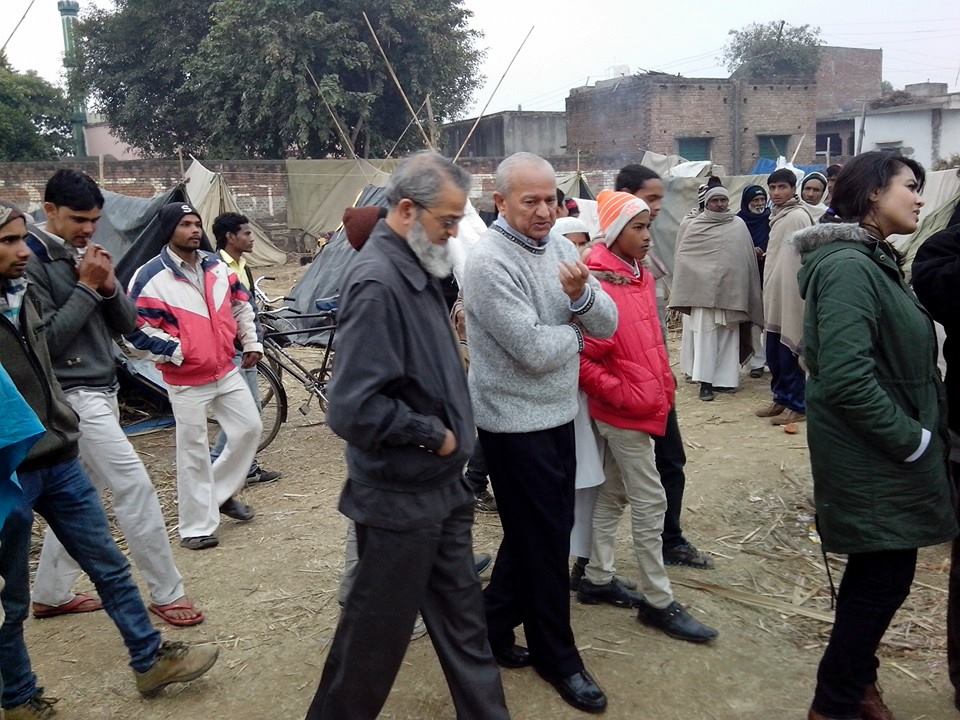An eight member delegation of the American Federation of Muslims of Indian Origin (USA & Canada) comprising of medical doctors, social workers, academics and others visited the Muzaffarnagar district in Uttar Pradesh on December 31st, 2013. The purpose of the visit was to inquire about the conditions of people who have fled their homes since the riots of September 2013 and to assess what help can be provided by the organization as per its mandate.
[galleria transition=”fade” speed=”3000″ height=”500 px” width=”650 px” enable=”image_crop,show_counter,show_imagenav,pause_on_interaction,lightbox”]
[image]http://www.afmi.org/images/muzaffarnagar/6775_n.jpg[/image]
[image]http://www.afmi.org/images/muzaffarnagar/46901_n.jpg[/image]
[image]http://www.afmi.org/images/muzaffarnagar/80682_n.jpg[/image]
[image]http://www.afmi.org/images/muzaffarnagar/472002_n.jpg[/image]
[/galleria]
The delegation visited Muzaffarnagar city and the surrounding area and interacted with the refugees, social workers, and community leaders. A total of three refugee camps were visited by the delegation where we spoke to scores of men, women and children.
Findings
- The delegation found that there are still thousands of Muslims living as refugees in camps and other locations despite the passage of four months since the riots first erupted. Data provided by the local workers show that at least 30,000 people were still living as refugees in camps as of Dec.31, 2013. This is in addition to thousands more who have found shelter with their relatives or are presently living in rented facilities.
- Dismantling of camps by state officials has forced the refugees to be continuously on the move.
- The conditions of the existing camps have been found wanting. The refugees have been forced to live in tarpaulin tents in freezing temperatures. This has resulted in the deaths of infants and the rapid spread of disease.
- The camps have no adequate sanitation, safe drinking water, schools, and other necessary facilities.
- The official compensation offered by the government is inadequate and not commensurate with the losses suffered by the victims. The process of getting it is also tedious. It comes with several caveats like not returning or claiming ownership of their homes.
- There is a sense of fear among the refugees. This was evident even in areas where there were no riots but where a general sense of insecurity prevails due to the intimidation and threats from a section of the Jat community.
- A number of refugees told us that in several villages they have been told by Jats that they cannot grow a beard, give Azan, or regularly attend the prayers in the Masjid.
- There is palpable fear among the refugees and none of them said that they would return to their villages. The response of the administration has been found lacking. The simple act of registering a FIR is so difficult that many of the victims have given up pursuing it. This has emboldened the accused who continue to roam free and intimidate.
- The refugees want to be settled in other places where they can be secure and safe. They expressed their strong desire to live together and not be dispersed.
- The education of most of the children in the camps and elsewhere has been suspended. Very rarely are there any organized and regular educational activities held.
- The health of pregnant women is a major concern with no health care available.
- The mental health of the victims, especially women and children, is also a concern on which very little attention has been paid. The interviews with refugees revealed their emotional and psychological scars.
- We found that many NGOs had done a great job in providing immediate short-term relief to the refugees. However, it was also found that there was very little coordination between them.
Our Demands to the state government
1) Stop the dismantling and forcible closure of camps until the refugees have been resettled or restored to their original homes (if they themselves deem it to be safe to return).
2) If restoration is not possible then the state administration should resettle at alternate locations. Instead of dispersing those residents of a village should be resettled together.
3) Decommunalize the state’s administrative and security apparatus.
4) Ease the process of registering FIRs.
5) Seriously investigate and prosecute the accused.
6) Take stern action against those still indulging in any form of intimidation, coercion, hate speech, or violence.
7) Initiate confidence building measures so that refugees regain back their sense of security.
8) Abolish the conditions placed for claiming the Rs.5 lakh compensation amount.
9) Make the compensation commensurate with the losses suffered by the victims.
Measures under consideration by AFMI
- Construction of homes for the refugees in resettlement colonies.
- Establishment of schools and support for other educational activities.
- Establishment of clinics.
- Research and documentation.

